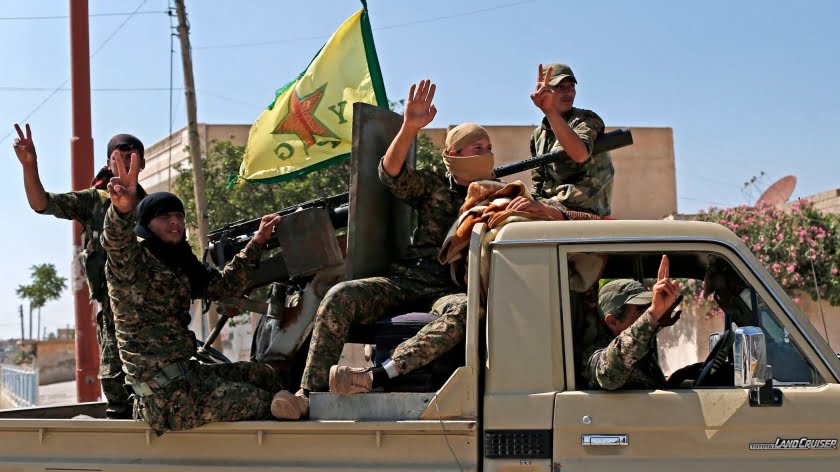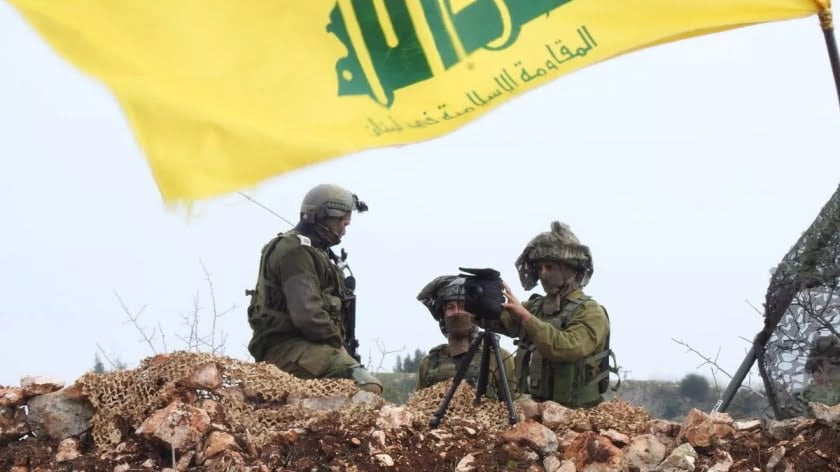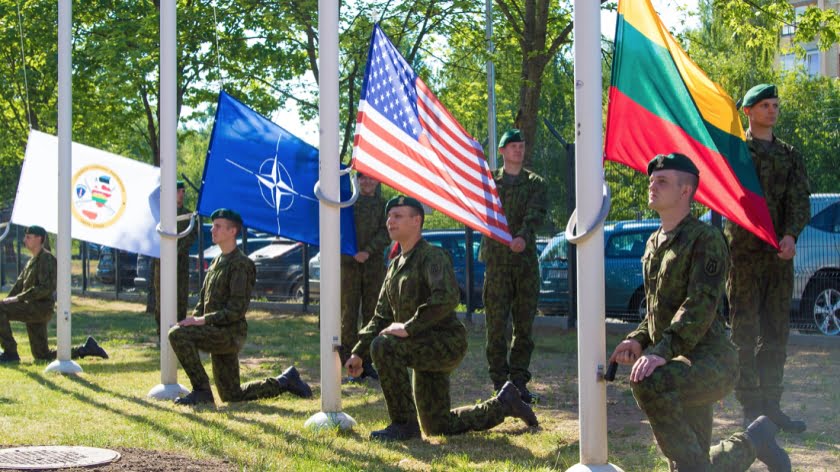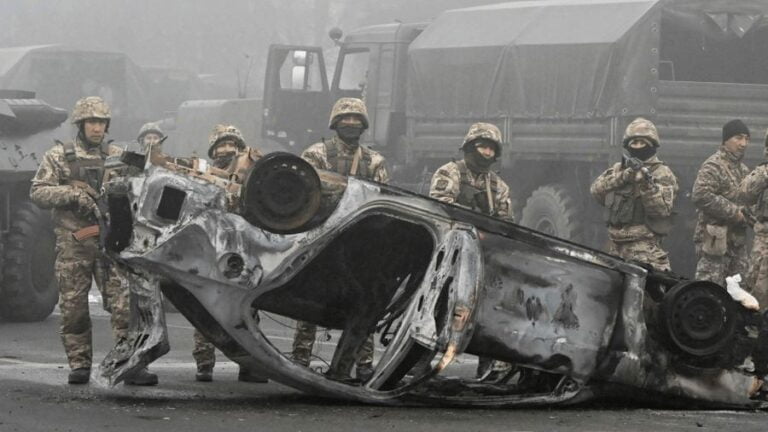Kurdish Soldiers Always Feared Trump Would be a Treacherous Ally
In a field beside a disused railway station on the plain just south of the Syrian-Turkish frontier, a brigade of Syrian Kurdish soldiers were retraining in order to resist an invasion by the Turkish army. “We acted like a regular army when we were fighting Daesh [Isis],” Rojvan, a veteran Kurdish commander of the YPG (People’s Protection Units), told me. “But now it is we who may be under Turkish air attack and we will have to behave more like guerrillas.”
Rojvan and his men had just returned from fighting Isis for 45 days in their last strongholds in eastern Syria. I had met him first in a cemetery in the Kurdish capital Qamishli where he was burying one of his men who had been killed by an Isis rocket when driving a bulldozer to build field fortifications in the middle of a battle.
But now he and his men were learning new tactics to combat the Turkish military units that were beginning to mass on the Turkish side of the border.
Rojvan was a very experienced soldier and not given to false optimism, saying: “We are mainly armed with light weapons like the Kalashnikov and the RPG [rocket propelled grenade] launcher and light machine guns, but we will be resisting tanks and aircraft.”
Rojvan was speaking 18 months ago after the Turkish army and its Syrian Arab allies had invaded the Syrian Kurdish enclave of Afrin, forced most of its inhabitants to flee, and was preparing to replace them with Arab settlers.
What happened then may have been a preview of what we are about to see repeated on a much wider scale in northeast Syria after President Trump’s incoherent announcement that the US would not stand in the way of a Turkish invasion.
He has rowed back a little on this in the face of a deluge of criticism, but his basic message – that the US wants out, and does not object to the Turks coming in – has developed its own momentum and will be difficult to stop at this stage.
We are already on the downslope leading to the ethnic cleansing of up to 2 million Kurds in the vast triangle of land which the Kurds call Rojava in northeast Syria. Much of the Kurdish population lives in cities and towns like Qamishli, Kobani and Tal Abyad just south of the Syrian-Turkish frontier. They are unlikely to wait to see what a Turkish occupation, backed by bands of Syrian Arab paramilitaries with links to al-Qaeda type groups, is like.
Trump’s support for America’s Kurdish allies was always rickety, but the brazenness of the final betrayal is still breathtaking. All the credit for defeating Isis is given to US forces under Trump’s wise leadership, while in reality the US role was almost entirely confined to airstrikes and artillery fire.
Speaking of the Kurdish role as the military core of the Syrian Democratic Forces (SDF) in the crucial battle for the Isis capital Raqqa, Brett McGurk, the former presidential envoy to the anti-Isis coalition, says on Twitter: “The SDF suffered thousands of casualties in the Raqqa battle. Not a single American life was lost.” Overall, 11,000 Syrian Kurds were killed fighting Isis over the last five years.
McGurk denies that the Kurds ever received lavish supplies of military hardware from the US: “The weapons provided were meagre and just enough for the battle against Isis. (The SDF cleared IEDs by purchasing flocks of sheep.)”
Since 2015 I have been visiting Rojava watching the YPG soldiers advance west and south and always wondering what would happen when Isis was defeated and the US did not need them anymore. The Kurds, who are no political neophytes, wondered the same thing, but there was little they could do to change the direction of events, except hope that the US would not entirely let them down.
It seems that, in the event, their most pessimistic assumptions are being fulfilled, though – such is the nature of the Trump White House – the extent of American betrayal is unclear.
The most important feature by far of the US military presence in Syria is airpower and not the small number of troops on the ground. Will the US maintain an air umbrella over Rojava and, if so, does this mean that the Turks will not be able to deploy their air force against the YPG? If this is indeed the case, it would give the 25,000 battle-hardened YPG troops more of a military option, though, even so, their chances of long-term success are limited.
It is unclear how far the Turks will advance: their attack could at first be in a limited area between the towns of Tal-Abyad and Ras al-Ayn. But the White House statement spoke of Turkey taking responsibility for Isis prisoners, most of whom are in a camp at al-Hol that is deep inside Rojava, close to the Iraqi border. Taking over this would mean the Turks seizing much of northeast Syria.
Do the Kurds have any political options? The only obvious one – supposing the Kurdish alliance with the US to be a broken reed – is to look to President Bashar al-Assad and to Russia. The Kurds do not like the Syrian government, which persecuted and marginalised them for years before 2011, but they do prefer them to Turkish control and probable expulsion.
The problem here is that the Kurds may have left it too late. So long as they were allied to the US, they could not seriously negotiate with Damascus. Now they appear to have the worst of all possible worlds: neither Washington nor Moscow nor Damascus is going to protect them.
But the options were never quite as simple as that: the Syrian army has never been strong enough to fight Turkey. Presidents Putin and Assad do not want a Turkish invasion but they will also be glad to see the back of the American forces.
The de facto Kurdish state of Rojava could swiftly disintegrate under the impact of a Turkish incursion. A scramble for its territory is already beginning: Syrian and Turkish army units are reportedly racing each other to take over the Arab city of Manbij just west of the Euphrates that has been under effective Kurdish control. A new chaotic phase in the Syrian war is beginning.
By Patrick Cockburn
Source: The Independent








No one seems to be stating the obvious, that Turkey’s basic purpose in this action, supported by the US, is actually to liberate the ISIS captured prisoners. We all know that nearly all the foreign contingent arrived through Turkey, and that they have been fighting America’s war against Assad. It all fits into place. A massive setback to the Syrian army’s almost completed cleanup job. They’ll join up with the “Free Syrian Army ” and carry on the fight. Now with Turkey’s open support and air support, instead of having to pretend to be fighting terrorism.
D J S